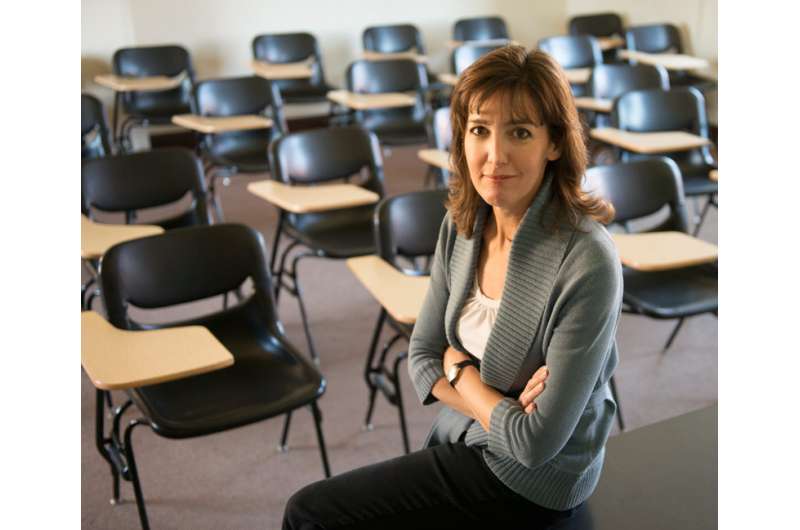Scholar suggests ways to craft more effective homework assignments

The quality of a homework assignment is important to student achievement, a Stanford scholar says.
But the devil is in the details, according to Denise Pope, senior lecturer at the Stanford Graduate School of Education, who recently published a book on the subject.
"The quality of the homework assignment and whether or not students find it meaningful can have a significant impact on student achievement, homework completion, motivation and physical health, Pope said in a recent interview.
She suggests that teachers think about the purpose of each assignment and she offers professional development and tools on how to create assignments that are relevant and engaging for the student – or "doable," as she puts it – without the help of others.
For example, Pope urges teachers to ensure homework directions are clear and then set aside time in class for students to start the work.
"This way, the teacher can answer questions early on – before the child gets home and realizes he doesn't understand the assignment," she said.
She also recommends that teachers aim for "authentic assignments" that can't necessarily be done efficiently in the classroom. This might include reading a chapter from a book to prepare for the class discussion the next day, or interviewing a community member for a school project, or collecting real data, such as water samples from a local source for a science lab.
Finally, while it may be difficult and time-consuming, Pope suggests teachers "differentiate homework" assignments when possible.
"A kid who can zip through 30 math problems in 10 minutes isn't necessarily benefitting from that assignment, but neither is the kid who takes 30 minutes to figure out the first two problems, and is so frustrated and exhausted that he never completes the rest of the set," she said.
Too much homework?
How much homework is too much? The answer to this question depends, Pope said, on which students and measurements are used.
For instance, some studies show that time spent on homework for elementary school students has increased slightly since the 1980s and decreased for older students, she said.
Other studies, she noted, show the opposite – that high school students are doing more homework than ever before and that elementary homework has declined. Also, recent studies show that some elementary students are doing three times the amount recommended by the National Education Association.
Pope, the co-founder of Challenge Success, said that research from that group found that high school students from high-achieving schools average more than three hours of homework each night, and middle school students average about 2.5 hours.
"How much is too much? Again, this depends. We have found that homework can be a source of stress for students and for parents," she said.
While students doing more hours of homework in the Challenge Success research seemed to be more engaged in school, they also suffered from physical health problems, sleep deprivation and a lack of balance in their lives, she said.
"When homework is a source of stress or causes battles at home, it can actually impede student motivation and learning," Pope said.
Measuring the impact of homework can be difficult.
"When researchers use grades to indicate the impact of homework, they may not account for the fact that homework completion often counts as part of the student's overall grade in the course," Pope said.
And, when research uses standardized tests to measure homework's impact, she continued, it is difficult to gauge how much of the overall improvement or decline in test scores is due to student learning in the classroom context as opposed to student learning from homework.
Finally, homework, because it is done at home, does not allow teachers to determine who is really doing the work. "Is it the student alone," Pope asked, "or are others, such as parents, tutors or friends, weighing in or doing the work for the child?"
Parents, communities and homework
When homework becomes a battle at home, both the child and the parent suffer, Pope said. She advises parents of younger students to let the teacher know if their children are spending more than the expected time to complete an assignment. Parents of older students should help their kids learn to communicate directly with the teacher about homework issues.
"Parents also have to provide enough time in the day for the student to get homework done," Pope said.
This involves monitoring how many extracurricular activities a child has so as to find a healthy balance among homework, sleep, socializing and other duties.
Parents do not need to be homework "police" or nighttime teacher, she suggested.
"When well-meaning parents correct homework assignments, or edit papers, or swoop in to rescue a child at the last minute on a project, they may be denying the child the opportunity to develop important academic skills as well as social and emotional skills such as self-regulation and resilience," Pope said.
And, they may be preventing the teacher from gauging the student's understanding of the subject matter, she added.
Similarly, parents who assign "extra" homework via workbooks or enrichment classes may be interfering with the course curriculum.
But if parents are worried that their child doesn't have enough schoolwork to do after school, they should encourage reading for pleasure – especially since that has been clearly shown to correlate with academic achievement, according to Pope.
Provided by Stanford University



















